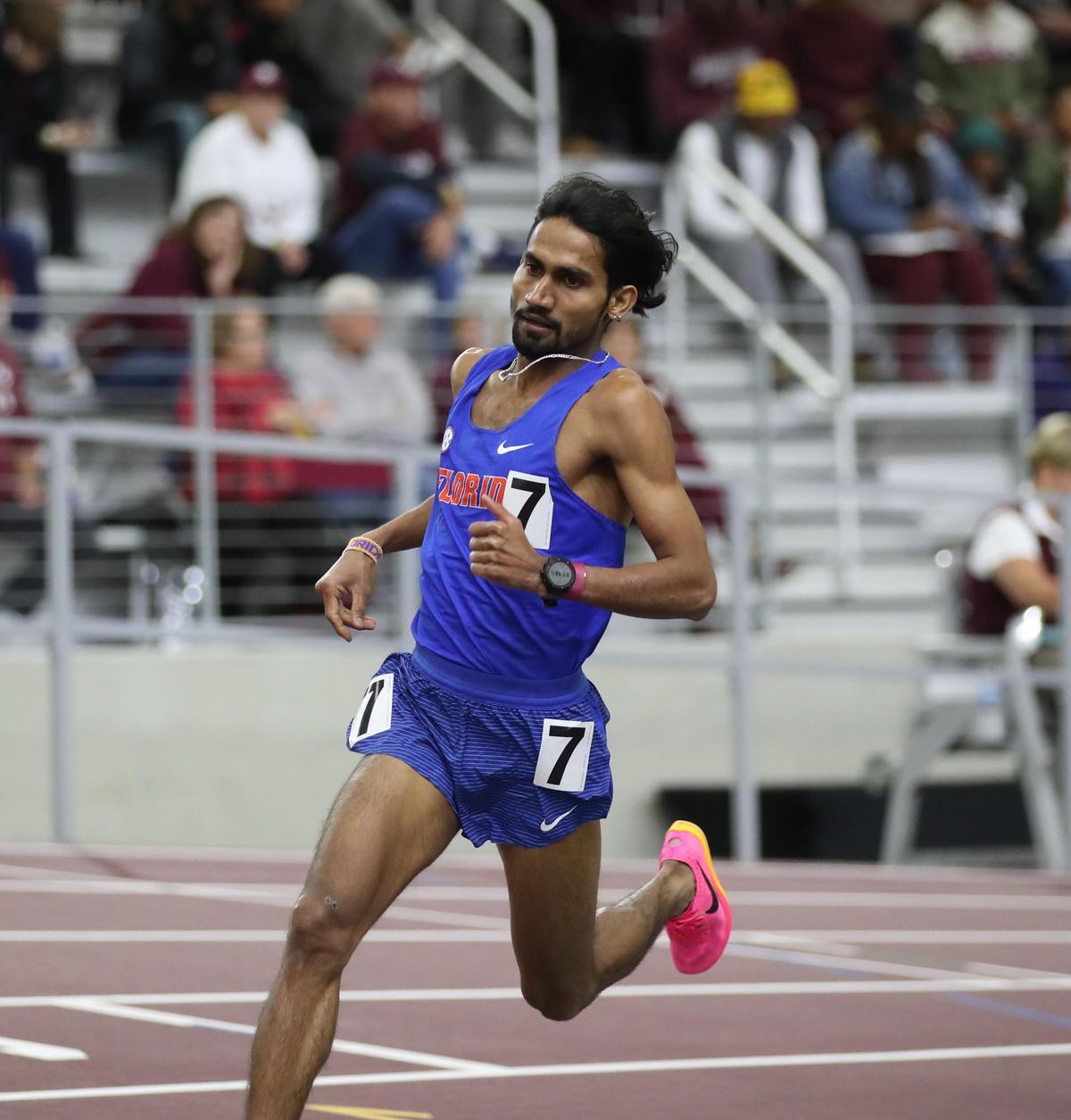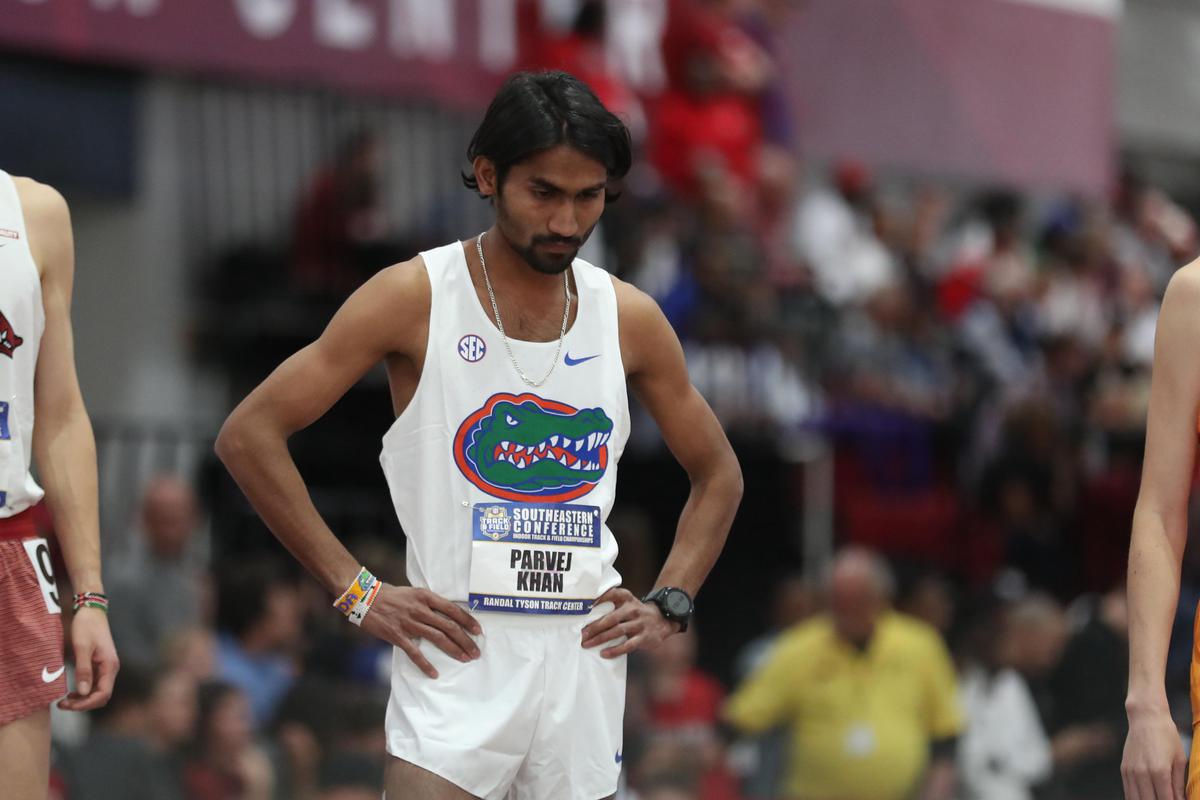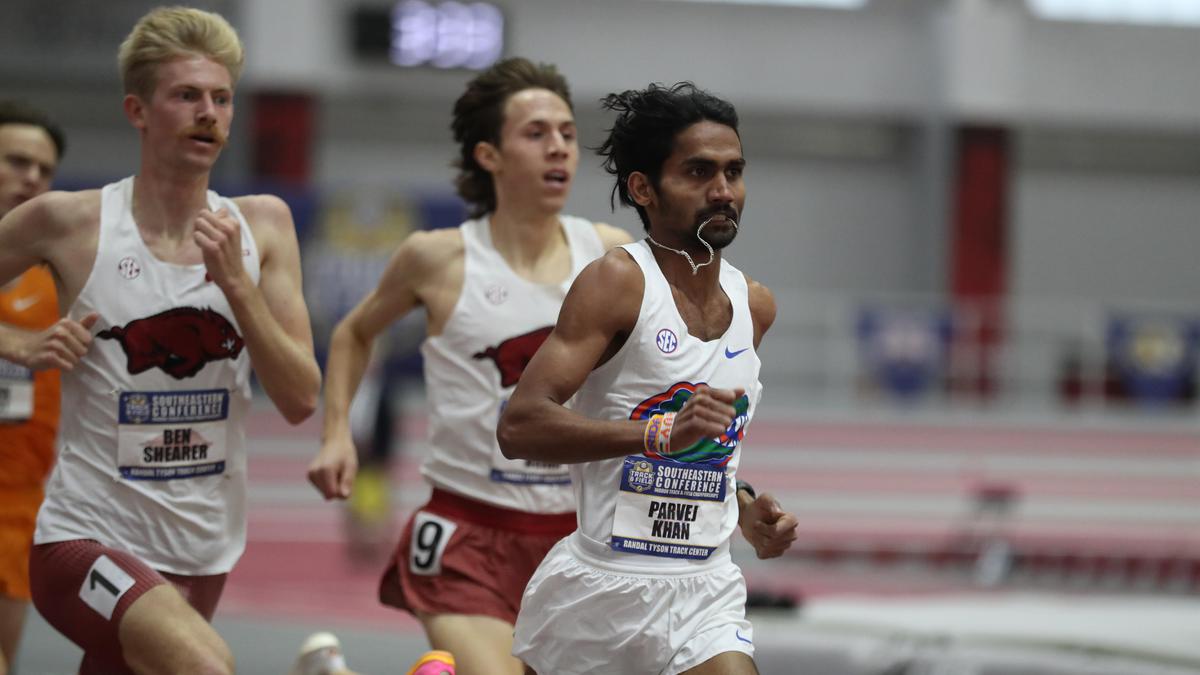From Mewat in Haryana to Gainesville in Florida, Parvej Khan’s journey to the NCAA finals
Regardless how it concludes, Parvej Khan will create history when he simply starts the mile race at the NCAA Indoor championships in Boston, Massachusetts on Thursday.
When the starter pistol fires and Khan sets off, the 19-year-old will be the first ever Indian track athlete to compete at an NCAA championship, probably the most competitive collegiate competition in the world.
It’s not the first time Khan has made history this year. Although he didn’t know it at that time, he also did so when he took third place in the mile race at the Razorback Invitational in Fayettville, Texas in January. Khan crossed the finish line in 3.59.20 – a new Indian indoor athletics record in the mile (1600m).
It’s a result that didn’t make the headlines in India. Nor did it when Khan broke the record again a week later with a time of 3.56.64 at the David Hemery Valentine Invitational at Boston University.
That mark was subsequently lowered even further when Khan clocked a time of 3.55.41 at the Terrier DMR Challenge at Boston University. And last Saturday, Khan didn’t set another national record but he did pull off a terrific final kick as he took first place at the SEC championships.
Over the next few days, expect even more highlights at the NCAA Indoor championships – where Khan qualified as one of the 16 top athletes in the US Collegiate system.

Khan is looking to be a pioneer in the USA for India on the running track.
| Photo Credit:
SPECIAL ARRANGEMENT
Khan is looking to be a pioneer in the USA for India on the running track.
| Photo Credit:
SPECIAL ARRANGEMENT
When he spoke to Sportstar after his win at the Razorback Invitational, Khan wasn’t even aware he had broken the Indian record.
“I’d never run an indoor mile before. After my first race, I was wondering if I might be the first Indian to have run the indoor mile,” he says.
Although Khan wasn’t the first, his experience in races run around 200m laps was still a novel one.
“It’s very different from running outdoors. You don’t have much space to overtake. And you always feel you are on a sharp turn,” he says.
It’s not just running indoors that’s a unique experience for Khan. It’s also who he’s running for. These days the jersey Khan wears is one with the alligator mascot of the ‘University of Florida’ emblazoned in front.
There has been a trickle of Indian athletes competing in the American Collegiate circuit – Tejaswin Shankar, Mohinder Singh Gill and Vikas Gowda have all won gold at the NCAA championships in the high jump, triple jump and discus throw, respectively.
None though were out-and-out track athletes. Although Khan is already counted as one of India’s top athletes over the 1500m – he won gold at the 2022 National Games in Gujarat – he’s now looking to be a pioneer in the USA for India on the running track.
When he signed with the University of Florida last year, he became the first Indian runner to earn a scholarship for a college in the highly competitive division 1 of the NCAA.
Modest beginnings
While his journey in America is only beginning, Khan can scarcely believe he has come as far as he has.
“I’m a boy from a village in Mewat. Back when I had started if you had told me back then that one day I’d be studying in the USA, training and running along with Olympic medallists, I wouldn’t have believed you,” he says.
Growing up in Chahalka, a village about 50 kilometers south of New Delhi in Haryana’s backward Mewat district, sports was not on his horizon. It couldn’t have been, with barely any money going around.
Khan’s father Nafees Ali grows wheat and cattle fodder on the five acres of land he shared with three other brothers.
“There’s very little money in farming. I grew just about enough for our family to eat and about enough fodder for our two buffaloes,” says Ali, who also works on other farms to earn extra cash.
Khan was well aware of his family’s circumstances.
“These days my elder brother drives a taxi in Gurgaon but when I was young there wasn’t even that. Neither my mother nor father are educated. They felt that there’s no future in sports. And in my village there’s no sportsperson. But I’ve always been someone who wanted to do something different,” says Khan.
While sports was not considered a viable career prospect, the Army was.
“There are a lot of people from my village who run to prepare for the army recruitment physical. I also joined and I slowly started enjoying it. I didn’t have a coach so I just copied what the older boys were doing,” he says.
Even early on, Khan says he knew he had talent, beating 17 and 18-year-olds when he was barely in his teens.
Khan was good enough to win a few local races but he knew early on that he had to leave his village for brighter prospects. At 13, he travelled by himself to New Delhi.
“Someone told me that in Delhi there was a big stadium where I could train on a synthetic track and under a proper coach. I told my parents, took a bus and came to Delhi. I had an uncle who drove a taxi in Delhi so I stayed with him and started training at Jawaharlal Nehru Stadium,” he says.

Though his talent as a runner wasn’t in doubt, Khan wondered whether he would meet the educational standard required to be admitted to the University of Florida.
| Photo Credit:
SPECIAL ARRANGEMENT
Though his talent as a runner wasn’t in doubt, Khan wondered whether he would meet the educational standard required to be admitted to the University of Florida.
| Photo Credit:
SPECIAL ARRANGEMENT
After a year in Delhi, Khan, alongside a couple of his friends, shifted to Bhopal to train at the Sports Authority of India (SAI). There, training under coach Anupama Srivastava, Khan’s career began to take off.
He won gold in the 800m at the U-16 nationals in Mangalagiri in 2019, took bronze over the same distance at the U-18 Khelo India Games the next year before winning his first senior race – the 1500m at the Open National Championships in Warrangal in 2021.
Khan rates the Warrangal gold the most significant of his career since he was recruited to the Indian Navy on the basis of the medal.
“My family doesn’t have a lot and with my salary I was at least able to pay off many of the loans my family had taken,” he says.
But job security aside, his domestic career would truly peak the following year when he won gold in the 1500m at the 2022 National Games with a new personal best of 3.40.89 at Gandhinagar.
It was on the back of that gold medal that Khan was included in the Indian national camp for the first time. In early 2023, he was part of an Indian training contingent that travelled to the USA’s Olympic training centre in Colorado. While a hairline fracture suffered during training forced him into a period of bed rest, it also opened up a path to a collegiate career.
Lucky break
“After my injury, I was thinking about my future and how I could get better. We had excellent facilities at the Olympic training institute in Colorado. I also saw that it was the same facilities that college students were using. I knew that if I had to develop as a runner, I had to train in the USA. One of my Instagram friends from Morocco was part of a college team. He suggested I also apply to one of the colleges here and even put me through to one of the coaches who he said was looking for international runners,” says Khan.
That coach was Will Palmer who had recently joined the staff at the University of Florida. He had previously coached at the University of Alabama and had produced an NCAA women’s champion in cross country and 10000m in Mercy Chelangat.
While the University of Florida is renowned for its sprints program – eight track athletes have won 17 Olympic medals between them over the past couple of decades – it hadn’t had nearly as much success in the middle-distance events.
“I first started speaking with Parvej around April last year. I felt he was the sort of runner who could be special. I knew he was talented just based on his age and the time he was clocking,” Palmer tells Sportstar.
While his talent as a runner wasn’t in doubt, Khan wondered whether he would meet the educational standard required to be admitted.
“I wasn’t a bad student but when I got into running, I only completed my school education through distance learning. In order to get admission in the USA, I was told I had to write my SAT (Standard Aptitude Test) exams. Although I was not at all confident, coach Palmer encouraged me to just give the exam as best I could,” he says.
With hardly any preparation, Khan would make his way to a center near the Colorado Olympic Center and write his SAT exam just before he was to return to India.
“There were questions on math and English comprehension. I answered what I could but I attempted every question,” he recalls.
Khan only got an admittedly modest score in his exam, but as Palmer had promised him, he was wanted for his running abilities.
With the scholarship offer letter in hand, Khan next approached his superiors in the Indian Navy for permission to study abroad.
“In the defence services, it’s really hard to get permission to study or train abroad. When I spoke to the captain of my unit, I told him that very few people get this opportunity and that I would do my best to improve as an athlete. They trusted me and I got that chance,” he says.
Culture shock
Khan admits he felt a bit like a fish out of water when he arrived at the University of Florida campus in Gainesville.
“I’d only ever spoken in Hindi all my life, so it was very hard for me to communicate at first. I also was admitted in a course in Sports Management. Education in the USA is not like in India where they will find a way to pass you anyway. Here you have to study and maintain a grade average. The maths minor in my course was particularly hard,” he recalls.
Khan’s routine is mapped out to the minute. “We have our first training at 6 a.m. Then breakfast. At 9.30 a.m. we have our first class. I will have a weight training session at about 2 p.m. and then at 6 p.m. I have tuition classes to help me get my studies up to the same level as my classmates. My studies only really end around 8.30 p.m. It used to feel really hectic. I used to think I’m getting up at 5 a.m. and my day isn’t done! Mai sochta tha yaar kaha fas gaya hu (I used to think, ‘Man, where have I come!’)“, he says.
Now, well into his first semester, Khan has found his feet.
“I’ve found a friend in one of my teammates on the running team. I’ve also found a group of Indian students who are studying here. Sometimes we’ll go out to an Indian restaurant. It’s also a lot easier for me to communicate now. Sometimes, when I speak to someone from India, I’ll say, ‘How are you doing?’ instead of ‘ Kaisa hai’ by mistake,” he laughs.
While language might have been a barrier, the one place Khan would immediately feel at home would be on the track. He remembers being in awe on his first day of training, when he went to the running track and found himself warming up alongside Grant Holloway, the Tokyo Olympic silver medallist in the 110m hurdles.
“I couldn’t believe it. I felt he was such a big star but he didn’t have any big attitude. He was very friendly towards me,” recalls Khan.
Hating to lose
Coach Palmer is impressed by Khan’s performance in the training room and track.
“Right now, his training has been focused on getting stronger aerobically while staying in touch with his speed. Generally, what I felt was that with a middle-distance athlete, the aerobic work can be challenging, but in Parvej’s case there’s nothing he’s done in training that seems to challenge him. He’s got not just a great attitude but also a lot of physical ability,” Palmer says.
That ability has had an impact in actual races as well. “One thing I’ve noticed is that Parvej hates to lose. You can’t coach that. He’s just a really good competitor. At the end of the race, when most people start getting tired, he finds an extra gear and manages to finish in front,” says Palmer.
If his coach is impressed with his determination to push himself to the very limit, Khan is grateful not just for the training facilities but also the environment he has been able to train in.
“In India, you are always scared of what your coach is going to do or say. Here, you have a lot more freedom. Also in India you are always being told about why you can’t do something. Here the thinking is to have big dreams and then think how you can accomplish them,” says Khan.
Coach Palmer says some of that is just inevitable when you are part of an elite training environment.
“In most places, if you are amongst the best then you are probably pretty unique. But in Florida, you have to be amongst the very best if you just want to fit in. We have some of the best athletes, swimmers, baseball players (athletes from the University of Florida won 18 medals at the Tokyo Olympics). Just being amongst a group of athletes like these pushes you to raise your own level,” he says.
Florida cult figure
Being in the midst of some exceptionally talented teammates hasn’t stopped Khan from developing a bit of a cult following though – with two-time world medallist in the heptathlon Anna Hall commenting with the emoji for fire on the Florida Gators Instagram post highlighting his SEC Championships win.
His penchant for finishing kicks hasn’t hurt nor has his signature move of catching his necklace in between his teeth as he runs. A couple of weeks ago, Khan was named freshman athlete of the week by the Gators for breaking and then improving his own school record in the indoor mile.
Palmer believes that Khan’s indoor records in the mile and even in the SEC championship gold will soon be overshadowed by even bigger accomplishments.
“I think he has the potential to be one of the very best in the NCAA. Running in the NCAA will not just make him a faster and better athlete and competitor, it will make him much more ready to run for India. I think he should be running for India all the time,” says Palmer.
That’s Khan’s goal as well. While his 2023 domestic season was curtailed by the toe fracture that got him to consider the collegiate route in the first case, he’s now looking to get his Indian career in the 1500m on track as well.
“It’s great that I’m doing well in the indoor competition, but my actual goal is to do well at outdoor competitions. I can’t say I’m not thinking about the Olympics. I can either qualify by meeting the automatic qualification standard (3.33.50) or through my ranking. I will try my best to qualify directly but I also think that there are a lot of points on offer at the outdoor NCAA championships. If I do well in that competition, it could really improve my chances of qualification,” says Khan.
Talks of the Olympics and the NCAA finals seem almost another dimension away from Chahalka, where Khan first started running.
“It’s hard to express just how far Parvej has gone. No one ever would have believed someone from our village would get on a plane, let alone going to America. But Parvej always believed in himself even when we didn’t. In fact, he keeps telling me and his mother that one day he’ll go even further. He says he’ll take us on a plane too!” says Ali.
With age on his side and no shortage of self-belief, Khan vows this won’t be an empty promise.
For all the history he has made, he is confident there’s more to come.
“I don’t think I’ve done anything yet. Abhi aur itihas karna hai (I’ve got more history to make),” he says.



